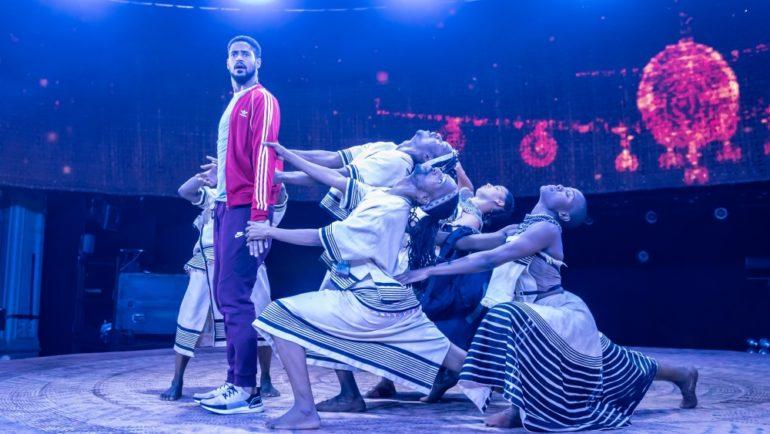U.K. Theater Review: ‘Tree’ Co-Created by Idris Elba
By Matt Trueman
LOS ANGELES (Variety.com) – People, like plants, have roots that run deep. “Tree” tries to tap into that, and finds that, the further you dig, the more tangled things get. Set in South Africa, where politics are still seen in black and white, Idris Elba and Kwame Kwei-Armah’s large-scale promenade show looks at the legacy of colonial land-grabs and violent fight-backs against apartheid to find that there’s no simple solution at hand today. The country itself is contested; identities have blurred. Scar tissue cannot be easily separated.
Inspired by Elba’s “Mi Mandela” album, a cross-cultural collaboration with British and South African musicians recorded after he shot “Mandela: Long Walk to Freedom,” the creative process of “” has, this week, overshadowed the opening. Two emerging writers, Tori Allen-Martin and Sarah Henley, sparked an authorship row , claiming the erasure of their early work — events disputed and denied by creatives and producers.
Whatever the real story behind the contractual dispute, “Tree” understands the balance of black trauma to hope, unpeeling the reality of South Africa’s past from the stories we tend to tell (and sell). It resets a sepia-toned image of anti-apartheid movements, often crystalized in the figure of the sage-like Mandela, and re-interrogates the fraught complexities and unhealed wounds that remain divisive in South Africa today.
After his mother’s death, Kaelo (Alfred Enoch), a mixed-race South African born and raised in Britain, heads back to her homeland to scatter her ashes and finds his father’s grave. “Tree,” then, is a tale of ancestral return, and Kaelo’s trip, his first time in South Africa, becomes an attempt to pinpoint his place in the world and in history. His identity is complex and contested. His wealthy, white grandmother (Sinéad Cusack) remains resentful of the way apartheid was overturned, having lost her soldier husband fighting against the fray. His hip, black half-sister (Joan Iyiola) agitates for further reform and repatriation. “F— Mandela,” she hollers to a swaggering crowd of Economic Freedom Fighter activists.
Enoch elegantly conveys the existential crisis of a mixed-race expat, showing the soul-stirring headswim of arriving in an alien country you can call your own. He walks around, wide-eyed, open-mouthed, absorbing it all — the chirruping crickets, the throat-scorching air, the hot, hard ground underfoot. Duncan McLean conjures the landscape in light, throwing swirling sunsets and ember-like stars onto the woven wicker screen that encircles Jon Bausor’s open space. Michael “Mikey J” Asante’s choral songs give South Africa voice.
The place seems to resonate right through Kaelo; every handshake, every step seems to vibrate. In Gregory Maqoma’s twisting choreography, Kaelo’s dreams turn his world inside-out, and when his family history materializes like a mirage — his mother (Lucy Briggs-Owen) dancing with a freedom-fighter employee (Kurt Egyiawan) — there’s a sense he contains a struggle against himself. Kwei-Armah’s script asks us to sympathize with the widow of a white solider who scythed black bodies down with his sword and with the guerrillas who take torches to her farm. Cusack is superb as the brittle and embittered landowner, a waif of a woman who’s watched her whole world fall away, while Iyiola shows how easily righteousness can sour. Throughout, systemic oppression is set against personal retribution. “Tree” is careful to put power itself under pressure, in whatever form it takes.
For all its socio-political scope, however, “Tree” can seem slim, a sketchy 90-minute skim. Kwei-Armah’s characters can lack shading, coming off more as points on an axis than as people in their own right. Kaelo’s mother is merely a white woman who sleeps with an employee, his father, a freedom fighter who betrays his family. Without knowing them as individuals, understanding their hopes and dreams, it can be hard to care about their eventual fate and, for all its momentum and its reflection, “Tree” shows us a story without fleshing it out. Elba’s music might have pulled us into the event — its contagious beats get right into your body — but it mostly goes missing until the play tees up a post-show party that, theoretically, brings the audience back into the same room.
Therein, arguably, lies the healing power of art, and for all that Bausor’s design splits us up with a raised platform, director Kwei-Armah’s participatory staging asks us to collaborate. It pulls us in to play trees and rivers, hands us anti-apartheid placards and has us storm the family farm. The idea is that we are all at once “the people oppressed and the people oppressing,” and while it could take the form further, “Tree” tangles us up together to undo division, root and branch.

